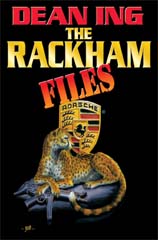
Once upon a time, my wife Marilyn and I went to England for a World Science Fiction Convention. On return, the Customs official scanned my passport and said, "Larry Niven the writer? Lucifer's Hammer?"
I said, "Right. You're a science fiction fan?"
"No," he said, and lifted the magazine he was reading. It was a publication for survivalists.
Lucifer's Hammer (written with Jerry Pournelle) was, at that time, being used as a survivalist text. Several of the surviving characters in that book are of that stamp: determined to make themselves self-sufficient and ready for anything the universe or the Soviet Union might throw at them.
The survivalists in Lucifer's Hammer weren't just ready for the collapse of civilization. They were eager. Dr. Forrester was an exception. He was a diabetic. He needed to find a group that would find him worth saving. Dr. Forrester's preparations were given in nitpicking detail. Dr. Pournelle researched them thoroughly, and that's what got the attention of the survivalists.
There are more survivalists than you think. Their ideal is self-sufficiency.
I raise the subject because Dean Ing is one of those. From my viewpoint it seems he can do anything with his hands. He designs and builds cars and planes and other tools, sometimes to leave a clean environment, sometimes to win races, sometimes—as in the Rackham stories—to weave a plausible near-future.
I'm not one of these myself: not good with my hands. I sometimes wonder if people like Dean Ing know how I see them. They're the original model for Motie Engineers (as in A Mote in God's Eye.) A better model might be Dr. Zarkhov from the Flash Gordon comic strip. He knows enough about anything to make the tool that fits.
This tool building talent is the most human of traits, but some of us have more of it than others.
Dean Ing wants you to survive, if you're smart enough to read his books.
He's a muscular guy, not spectacularly tall, who weighs no more than he should. In this respect he's quite different from his character Rackham. But Rackham is another Zarkhov: he can make a tool on the spot. The difference is that you will understand the tool. You'll be able to make it yourself.
The Rackham stories date from the Cold War. That's okay. The laws of physics and engineering haven't changed.
My favorite of his novels is Soft Targets. If I tried to describe the premise, you wouldn't believe me. It's up-to-the-minute relevant. I just can't quite believe it would work.
—Larry Niven
September 2003